The recent nuptials of Vidhi Shangvi and Vivek Salgaocar, saw the cream of Mumbai participate in what was described as a high-profile alliance between two prominent business clans
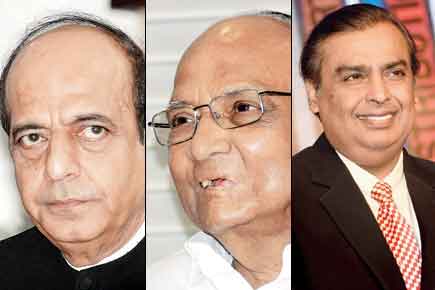
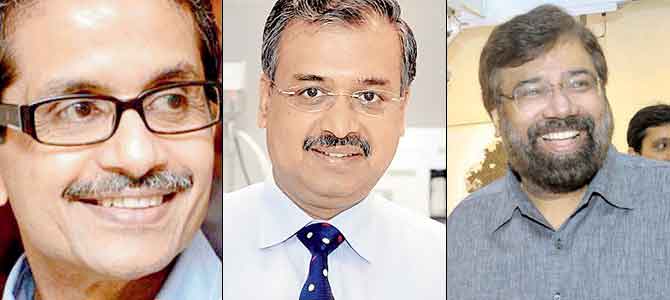
Shiv Salgaocar, Dilipâu00c2u0080u00c2u0088Shanghvi and Harsh Goenka
ADVERTISEMENT
 The recent nuptials of Vidhi Shangvi and Vivek Salgaocar, saw the cream of Mumbai participate in what was described as a high-profile alliance between two prominent business clans.
The recent nuptials of Vidhi Shangvi and Vivek Salgaocar, saw the cream of Mumbai participate in what was described as a high-profile alliance between two prominent business clans.
The bride is the daughter of Dilip Shangvi, one of the country’s richest men, and the groom, who hails from the well-heeled, but low key Salgaocars, originally of Goa, has old links with the city’s financial community. The celebrations were kicked off by a dinner hosted by the groom’s side at a five-star, which saw attendance by the city’s top business names. This was followed by a sangeet at the Tote, and a reception at the Turf Club last evening.
Politicians who attended, included Manohar Parrikar, Sharad Pawar, Uddhav Thackeray, Ahmed Patel, Devendra Fadnavis, Ravi Shankar Prasad and Dinesh Trivedi. There were also big ticket biz men like Mukesh Ambani, the Bajajs, Harsh Goenka and Raj Salgaocar (who is the groom’s uncle). Also present were Pankaj Patel (Cadila) and Sudhir Mehta (Torrent).
“What’s best of all,” says a guest, “is that even though the bride’s father is one of the country’s richest men, the wedding was conducted in a tasteful but understated way. Such a great example in these times of unchecked conspicuous consumption.”
Ah, Kolkata
When Rakhi Sarkar, director of the Centre of International Modern Art (CIMA), one of Kolkata’s leading art galleries, had stood before an august gathering of Mumbai’s art community last year at the Bhau Daji Lad Mumbai City Museum, and given an impassioned talk on her grand vision of a national corridor of art, it had sounded like a welcome but fantastic dream. “Why can’t there be synergy between the Kala Ghoda Festival, the Delhi Art Fair, the Kochi Biennale and the Kolkata Art Fair, so that these separate initiatives in the north, south, east and west of the county pool their resources and come together in some synergy?” she’d said.
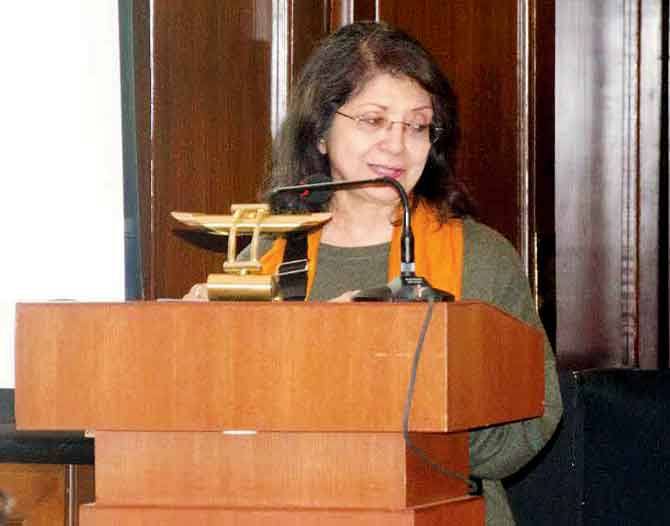
This weekend, while flying into Kolkata to attend CIMA Awards that kicked off The Kolkata Art Festival 2017, it occurred to us that Sarkar had been as good as her word. The month-long, pan-city festival of arts, with collateral ventures like seminars, discussions and workshops, and the participation of galleries, museums and educational institutions across Kolkata, had been perfectly aligned with other art festivals like the Jaipur Lit Fest, and Delhi’s India Art Fair, and the Kochi Biennale, and Kala Ghoda Festival, so that they could ‘all seamlessly flow one into the other,’ exactly as Sarkar had said.
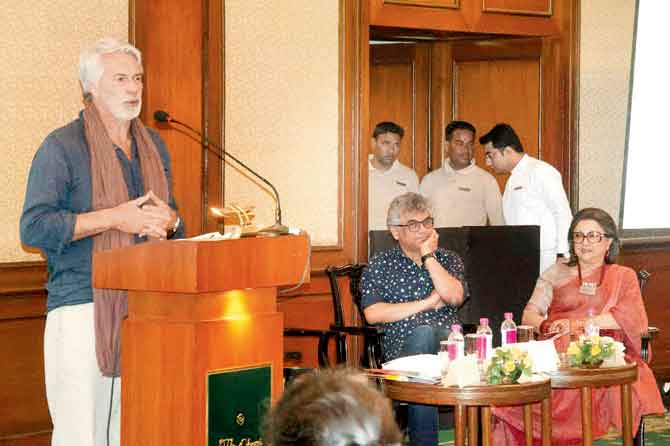
Chris Dercon former director, Tate Modern and intendant of Volksbuhne, Berlin, filmmaker Suman Mukherjee and actress-director Aparna Sen
But of course, this being Kolkata, a city once described by award-winning journalist Ian Jack as ‘a ruin, haunted by culture,’ the CIMA Awards, Kolkata Art Fair stood apart from the aforementioned with its emphasis on scholarship, inclusivity, and abiding respect for the arts.
The awards saw entries come in from talented young artists from 22 Indian states. From the international symposium that was ably curated by historian Alka Pande, and featured scholars and leading art authorities like Chris Dercon, former director Tate Modern; renowned actress-director Aparna Sen; Sophie Makariou, president and curator Musée Guimet; and Sunil Khilnani, professor and director Kings India Institute, Kings College, London, among others; to the vibrant exhibitions across the city, including a traveling show from Germany in collaboration with the Goethe Institute, the festival which goes on for a month is a feast for the senses.
There was great intellectual discourse (over dinner one evening we found ourselves discussing everything from artificial intelligence and Big Data to gender politics with an underground musician, a graphic novelist, and an IT entrepreneur from different parts of the world); exquisite art, grand dinners in stately homes and extremely stylish women (Kolkata women are arguably the best dressed in the country).
With its broad sweeping roads, its maddeningly cultured populace, its sweeping maidans and leafy avenues, Kolkata, the only big city in India to have actually improved over the years, certainly appeared to be haunted by culture, though it appeared to have heroically outgrown its ‘ruin’ nomenclature. We like!
Hundred years of excellence
Amarchand Mangaldas is known to be one of the country’s oldest and most venerated law firms, and last evening, the cream of Mumbai gathered at the Crystal Room, Taj, to celebrate a century of dedicated service.
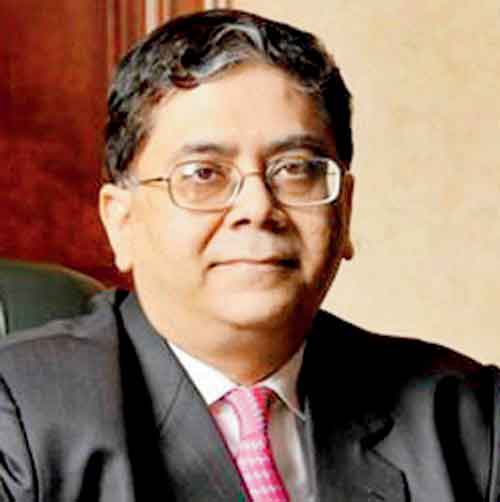
Cyril Shroff
‘Cyril and Vandana Shroff request the pleasure of your company to celebrate 100 years of value,’ the invitation said and promised a time to bond, a welcome address by Shroff, a musical celebration by Rahul Sharma, and dinner followed by ‘liquors and paans.’
And given that the Shroffs are connected by marriage to Gautam Adani, (their daughter is married to his son) the evening was expected to see its fair share of high-profile representation from the word of finance, law, politics and society.
Furious creative contest
“The founders of independent India promoted a romantic sense of the Indian past... Jawaharlal Nehru famously described Indian history as a palimpsest, where each successively dominant culture, religion, or group left its traces, never quite effacing what came before...Yet what history, of any country, is in reality as passive as this?” said Prof Sunil Khilnani, in his keynote address during the Kolkata Art Fair at the stately Bengal Club on the subject of his recent book, ‘Incarnations: India in 50 Lives.’
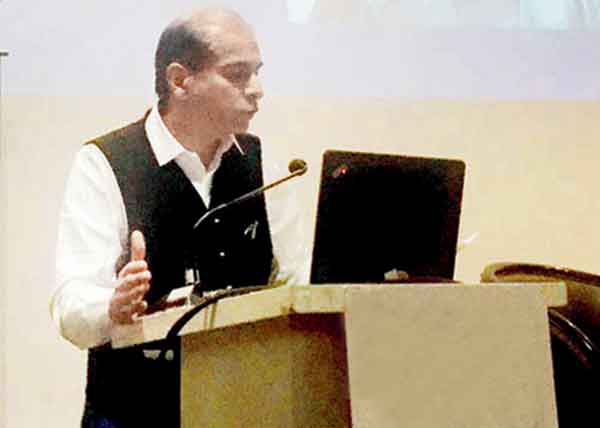
Sunil Khilnani
“My book tries to bring... the Indian past into focus as an arena of furious, often creative contest: a space of suppressions, subversions and historical guerilla actions. A place where dead heroes regularly spring back to life, dispatched to the frontlines of contemporary cultural and political battles,” he said in a riveting presentation that touched upon Asoka, the mysterious disappearance of Buddhism from India; the poet Iqbal; Jamsetji Tata’s pioneering globalism; Aryabhata, whose views on astrology were shaped by Hellenistic ideas; Dara Shikoh and the liberal parlour game of ‘what if he’d ruled India’, Subhash Chandra Bose and his misplaced but well intentioned internationalism; the Ethiopian teenager Malik Amber and his intervention into the expansionist plans of emperors Jahangir and Aurangzeb; and finally Dhirubhai Ambani, whose thoughts shaped the financial landscape of the country.
What’s more, there was pin drop silence in the hall as he spoke, not a single woman checked her make-up surreptitiously, nor man stifled a yawn and the ensuing questions from the audience were intelligent, considered and incisive. Put that in your pipe and smoke it Mumbai.
 Subscribe today by clicking the link and stay updated with the latest news!" Click here!
Subscribe today by clicking the link and stay updated with the latest news!" Click here!






